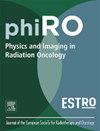比较用于直肠癌短程治疗的强质子放疗和在线自适应光子放疗
IF 3.4
Q2 ONCOLOGY
引用次数: 0
摘要
背景和目的图像引导质子束疗法(IG-PBT)和基于锥束 CT(CBCT)的在线自适应光子放疗(oART)具有限制放射毒性的潜力。在局部晚期直肠癌(LARC)的多模态治疗中,这两种疗法都被假定能减少限制性肠毒性。本研究旨在量化这些模式的相关剂量-体积指标的差异。材料与方法模拟 18 名 LARC 患者的六自由度 IG-PBT 和 oART 短程放疗(SCRT)。IG-PBT 的相对生物有效性 (RBE) 为 1.1。使用后 CBCT 对投放剂量进行评估。如果 99% 临床靶体积的平均剂量≥处方剂量的 95%,则认为目标覆盖稳健。使用剂量-体积直方图比较风险器官(OAR)剂量,并使用剂量-反应模型估计严重肠毒性。对于主要的 OARs,IG-PBT 增加了≥ 15 Gy(RBE)的暴露量,但减少了较低剂量的暴露量。低剂量和高剂量暴露于肠道襻的情况在不同模式之间有显著差异(中位数(四分位数间距)IG-PBT-V8.9Gy(RBE) = 92 (51-156) cm3,oART-V8.9Gy(RBE) = 166 (107-234) cm3,p < 0.001;IG-PBT-V23Gy(RBE) = 62 (25-106) cm3,oART-V23Gy(RBE) = 38 (18-75) cm3,p < 0.001),转化为相似的总≥3级肠毒性风险。oART 减少了暴露于 15 Gy(RBE)或更高剂量的 OAR 的体积,而 IG-PBT 则减少了低于此剂量的体积。本文章由计算机程序翻译,如有差异,请以英文原文为准。
Comparing robust proton versus online adaptive photon radiotherapy for short-course treatment of rectal cancer
Background and purpose
Image-guided proton beam therapy (IG-PBT) and cone-beam CT (CBCT)-based online adaptive photon radiotherapy (oART) have potentials to restrict radiation toxicity. They are both hypothesised to reduce therapy limiting bowel toxicity in the multimodality treatment of locally advanced rectal cancer (LARC). This study aimed to quantify the difference in relevant dose-volume metrics for these modalities.
Material and Methods
Six-degrees-of-freedom IG-PBT and oART short-course radiotherapy (SCRT) were simulated for 18 LARC patients. Relative biological effectiveness (RBE) was 1.1 for IG-PBT. Delivered dose was evaluated using post-CBCTs. Target coverage was considered robust if average dose to 99% of the clinical target volume was 95% of the prescription. Organ at risk (OAR) doses were compared using dose-volume histograms and severe bowel toxicity estimated using dose–response modelling.
Results
Target coverage was robust in all patients for oART and all but one patient for IG-PBT. For the main OARs, IG-PBT increased the volume exposed to 15 Gy (RBE), but reduced volumes exposed to lower doses. Both low- and high-dose exposure to bowel loops were significantly different between the modalities (median (interquartile range) IG-PBT-V8.9Gy(RBE) = 92 (51–156) cm3, oART-V8.9Gy(RBE) = 166 (107–234) cm3, p < 0.001; IG-PBT-V23Gy(RBE) = 62 (25–106) cm3, oART-V23Gy(RBE) = 38 (18–75) cm3, p < 0.001), translating into similar total grade ≥ 3 bowel toxicity risk.
Conclusion
IG-PBT and oART delivered comparable and satisfying target coverage in SCRT for LARC with similar estimated risk of severe bowel toxicity. Volumes of OAR exposed to 15 Gy (RBE) or more were reduced by oART, while IG-PBT reduced the volumes receiving doses below this level.
求助全文
通过发布文献求助,成功后即可免费获取论文全文。
去求助
来源期刊

Physics and Imaging in Radiation Oncology
Physics and Astronomy-Radiation
CiteScore
5.30
自引率
18.90%
发文量
93
审稿时长
6 weeks
 求助内容:
求助内容: 应助结果提醒方式:
应助结果提醒方式:


